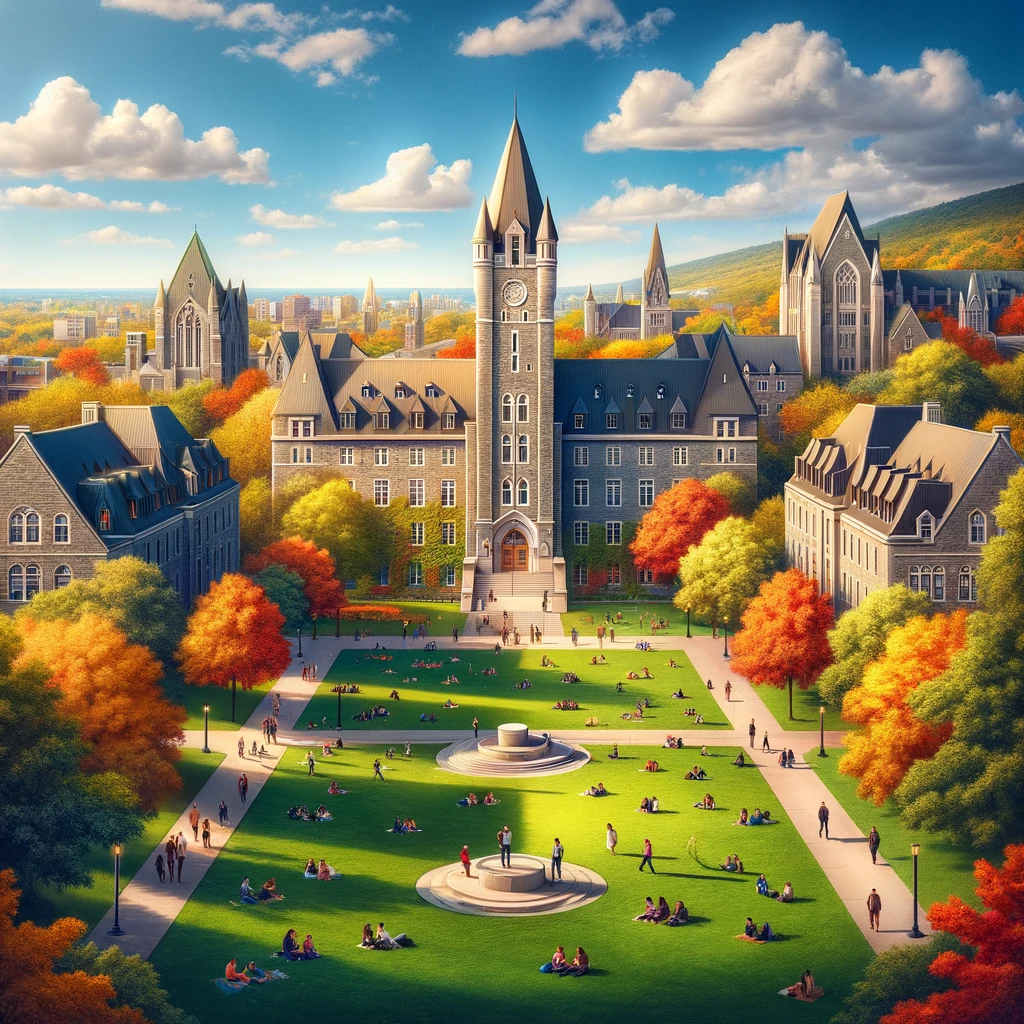McGill University is a prestigious public research university located in Montreal, Quebec, Canada. Founded in 1821, McGill is one of Canada’s oldest and most renowned universities. It is known for its rigorous academic programs, world-class faculty, and diverse student body. McGill offers undergraduate, graduate, and professional degrees in various fields, including arts, sciences, engineering, law, medicine, and business.
The university has a strong emphasis on research and is consistently ranked among the top universities globally. McGill’s main campus is located in downtown Montreal, offering students access to a vibrant city that is both French- and English-speaking, making it an ideal place for cultural exchange and academic growth.
McGill is also known for its diverse and international student body, attracting students from across Canada and around the world. It is home to numerous student organizations, research centers, and a broad network of alumni who have contributed to various fields globally.
1. Academic Reputation and Rankings:
McGill consistently ranks as one of the top universities in Canada and is highly regarded internationally. It is often ranked in the top 30-40 universities globally. In particular, McGill is known for its strengths in various fields:
- Medicine: McGill’s Faculty of Medicine is one of the oldest and most respected in Canada. It offers one of the most prestigious medical programs in the country.
- Law: McGill Law is one of the top law schools in Canada and offers a unique transsystemic approach, combining both common law and civil law traditions, which reflects the bilingual nature of Quebec.
- Engineering: McGill’s Faculty of Engineering is highly regarded for its innovation and research contributions, particularly in fields such as biomedical engineering, environmental engineering, and materials science.
- Sciences: The Faculty of Science is known for its high-impact research and contributions to various scientific fields, including biology, physics, and chemistry.
- Business: The Desautels Faculty of Management is also globally recognized for its strong undergraduate and MBA programs.
2. Research Excellence:
McGill is recognized as a leading research university. It has an impressive portfolio of research facilities, including the McGill University Health Centre (MUHC), one of the largest healthcare networks in Canada. The university attracts significant funding for research in various disciplines such as medicine, engineering, artificial intelligence, and environmental science.
The university hosts numerous research institutes, including:
- The McGill Institute for the Study of Canada
- The McGill Institute of Air and Space Law
- The Brain Imaging Centre
3. Student Life:
- Cultural Diversity: McGill is known for its diverse student body, with students coming from all over Canada and more than 150 countries worldwide. This multicultural environment contributes to a rich social and academic experience.
- Language: While McGill is located in Montreal, a French-speaking city, the university operates primarily in English. This makes it an attractive option for both English- and French-speaking students. However, there are opportunities for students to learn French or immerse themselves in the local francophone culture.
- Clubs and Societies: McGill offers a wide array of student-run clubs and organizations, including academic, cultural, athletic, and professional groups. The McGill Students’ Society (MSS) is the umbrella organization for many of these activities.
- Athletics: McGill has a strong sports culture, with varsity teams competing in the Quebec Student Sports Federation (RSEQ). The university offers various intramural and recreational sports programs, and students have access to state-of-the-art athletic facilities.
4. International Community:
McGill’s global presence and reputation attract many international students. In addition, the university has strong partnerships with academic institutions around the world, offering exchange programs and collaborative research opportunities. McGill’s Global Internship Program and Study Abroad Program allow students to gain international experience.
5. Campus:
- Downtown Montreal: The main McGill campus is located in the heart of Montreal, a vibrant and multicultural city. Students benefit from the cultural and professional opportunities available in the city, including internships, networking events, and proximity to various industries.
- Beautiful Architecture: McGill’s main campus is noted for its beautiful architecture, including the historic Redpath Museum and Rutherford Physics Building. The university also has a mountain campus on the slopes of Mount Royal, offering students scenic views of the city and ample outdoor activities.
- Libraries and Facilities: McGill has one of the largest library systems in Canada, including the McGill Library and the Osler Library of the History of Medicine. The university’s facilities include specialized labs, art studios, and performance spaces.
6. Alumni and Notable Figures:
McGill boasts an extensive and influential alumni network, with graduates who have excelled in various fields such as politics, business, medicine, arts, and science. Notable alumni include:
- Justin Trudeau – Prime Minister of Canada
- William Shatner – Actor, best known for Star Trek
- Leonard Cohen – Legendary Canadian singer-songwriter and poet
- Norman Bethune – Renowned Canadian physician and medical innovator
7. Admissions:
McGill is highly competitive, with a low acceptance rate, particularly for its more popular programs like medicine, law, and engineering. Applicants are assessed based on academic achievement, standardized test scores (such as the SAT or ACT), extracurricular activities, and personal statements. The admissions process may vary depending on the program and applicant’s background.
- Undergraduate: McGill offers a wide range of undergraduate programs. Many students pursue a Bachelor of Arts or Bachelor of Science, but the university is also known for its specialized programs in engineering, music, and business.
- Graduate: McGill offers graduate programs at the master’s and doctoral levels across a wide variety of fields, with strong opportunities for research-based graduate studies.
8. Financial Aid:
McGill offers a variety of financial aid options, including scholarships, grants, and work-study programs. The university provides support for students through the McGill Financial Aid Program, and many scholarships are available for both Canadian and international students.
1. History and Legacy
McGill University was established in 1821 through a generous endowment by James McGill, a Scottish merchant and philanthropist. Initially known as McGill College, it became a cornerstone of higher education in Canada. Some historical milestones include:
- 1829: The creation of Canada’s first faculty of medicine.
- 1884: The founding of the Royal Victoria College, dedicated to women’s education.
- 1905: Expansion with the establishment of the Macdonald Campus for agricultural and environmental sciences.
McGill has been integral to Canada’s intellectual growth and social progress, and its historic buildings reflect a blend of old-world charm and modern innovation.
2. Campuses
McGill operates on two main campuses:
- Downtown (Main) Campus:
- Location: Nestled at the foot of Mount Royal in the heart of Montreal.
- Features: A mix of Gothic, neoclassical, and modern architecture. Key buildings include Redpath Library, the Arts Building, and the McIntyre Medical Sciences Building.
- Nearby Attractions: Students can easily access cultural landmarks like the Montreal Museum of Fine Arts, theaters, and shopping districts.
- Macdonald Campus:
- Location: Situated in Sainte-Anne-de-Bellevue, about 30 km west of downtown Montreal.
- Focus: Dedicated to agriculture, environmental sciences, and food science.
- Facilities: Includes research farms, greenhouses, and the Lyman Entomological Museum.
3. Faculties and Schools
McGill is organized into 11 faculties and 13 schools, offering over 300 programs. The major faculties include:
- Faculty of Arts: The largest faculty, offering programs in humanities, social sciences, languages, and interdisciplinary studies.
- Faculty of Science: Known for strong research in natural sciences, mathematics, and computer science.
- Faculty of Medicine and Health Sciences: Includes medical programs, dentistry, nursing, and public health.
- Faculty of Engineering: Offers programs in civil, mechanical, electrical, chemical, and computer engineering.
- Desautels Faculty of Management: Offers BCom, MBA, and executive programs.
- Faculty of Law: Offers a combined BCL/JD program and is recognized for its bilingual and bijural approach.
4. Research Excellence
McGill is a member of Canada’s U15 Group of Research Universities and has a global reputation for research breakthroughs. Some notable research areas include:
- Biomedical Sciences: McGill researchers pioneered advancements in neuroscience and genomics, particularly through the Montreal Neurological Institute and Hospital (The Neuro).
- Artificial Intelligence (AI): Collaboration with Montreal’s burgeoning AI industry, including participation in the MILA (Montreal Institute for Learning Algorithms).
- Space Exploration: The McGill Institute for Aerospace Engineering works closely with space agencies, contributing to aerospace innovation.
- Climate Change: Research on sustainability and climate science is a priority, with significant projects led by the Trottier Institute for Sustainability in Engineering and Design (TISED).
5. Libraries and Collections
McGill boasts one of Canada’s largest library systems, housing over 7 million volumes. Key libraries include:
- McLennan-Redpath Library Complex: The main hub for humanities and social sciences.
- Osler Library of the History of Medicine: A renowned collection of historical medical texts.
- Rare Books and Special Collections: Holds rare manuscripts, early maps, and archival materials.
6. Innovation and Entrepreneurship
McGill actively supports innovation through programs and facilities like:
- McGill Dobson Centre for Entrepreneurship: Offers support for student startups through mentorship and competitions like the Dobson Cup.
- Innovation Labs: Provides collaborative spaces for research in AI, robotics, and sustainable technologies.
- McGill Engine Centre: Focuses on supporting engineering students in developing and commercializing their ideas.
7. International Engagement
McGill has partnerships with institutions worldwide, offering numerous exchange and study-abroad opportunities. The university hosts events like the McGill Model United Nations (McMUN) and collaborates on global research initiatives. The university’s Global Health Programs focus on issues like infectious diseases, mental health, and healthcare equity.
8. Support Services and Student Well-being
McGill offers a comprehensive range of student services:
- Health and Wellness: The Student Wellness Hub provides mental health services, counseling, and health care.
- Career Planning Service (CaPS): Supports students with job searches, internships, and career counseling.
- Office for Students with Disabilities (OSD): Ensures accessibility and support for students with diverse needs.
9. Traditions and Campus Culture
McGill is rich in traditions and student-driven activities, including:
- Frosh Week: A fun, student-led orientation week for new students.
- Redmen and Martlets: Former names for McGill’s varsity sports teams, now called the McGill Redbirds (men) and McGill Martlets (women).
- Winter Carnival: A longstanding tradition filled with activities like ice-skating and games.
- Open Air Pub (OAP): A beloved outdoor beer garden held on campus at the end of summer.
10. Sustainability Initiatives
McGill is committed to sustainability through efforts like:
- Vision 2020 Climate & Sustainability Action Plan: Aims to achieve carbon neutrality by 2040.
- McGill Office of Sustainability (MOOS): Leads green initiatives, including reducing waste and promoting sustainable food.
- Edible Campus: An urban garden initiative supplying fresh produce to local communities.
11. Montreal – The Student Experience
McGill’s location in Montreal offers:
- Cultural Diversity: Montreal is known for its festivals, museums, and vibrant arts scene.
- Bilingual Environment: Students can practice both English and French.
- Affordable Living: Compared to other major cities, Montreal offers lower living costs for students.
- Public Transit: Excellent metro, bus, and bike-sharing services.
Quick Facts
- Motto: “Grandescunt Aucta Labore” (By work, all things increase and grow)
- Student Enrollment: ~40,000
- International Students: ~30%
- Mascot: Marty the Martlet
- Colors: Red and White


